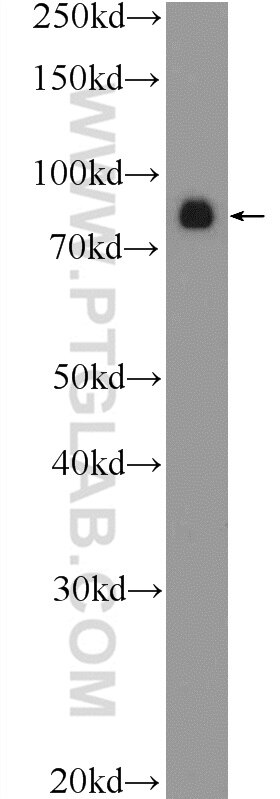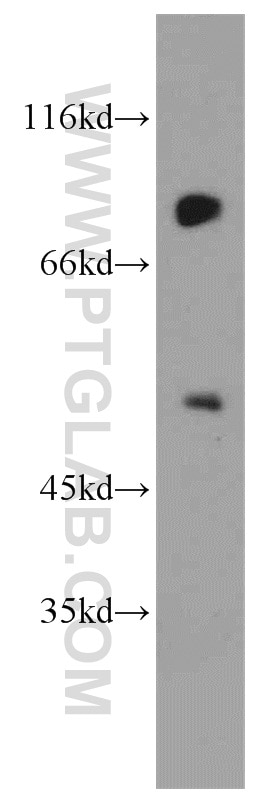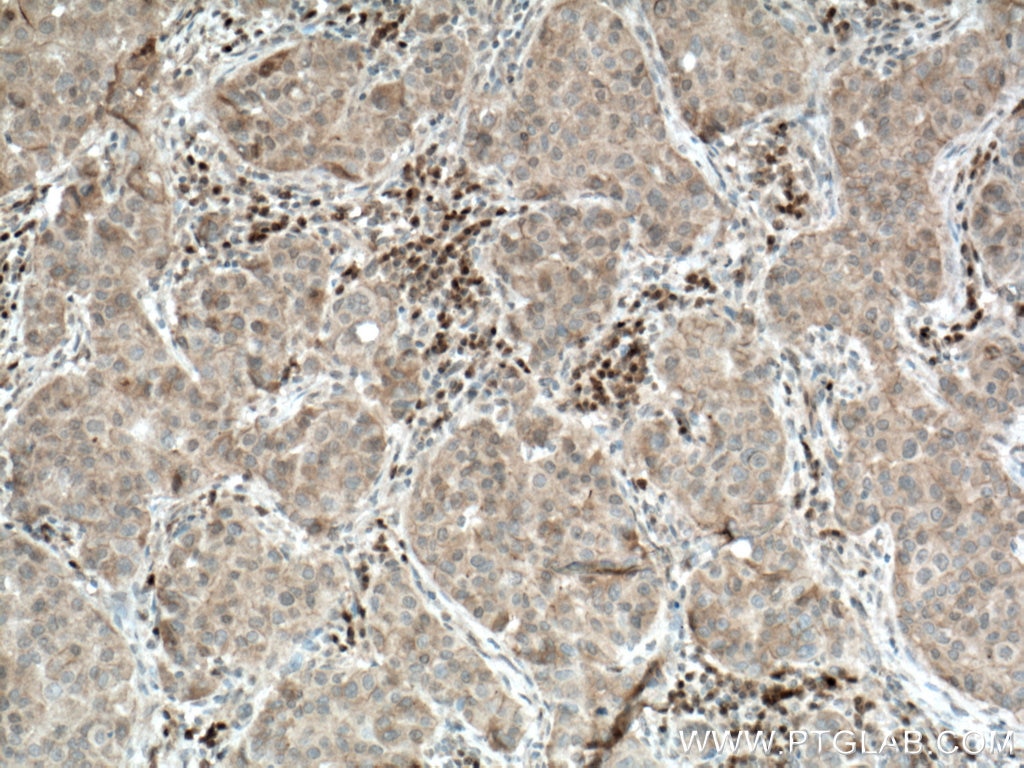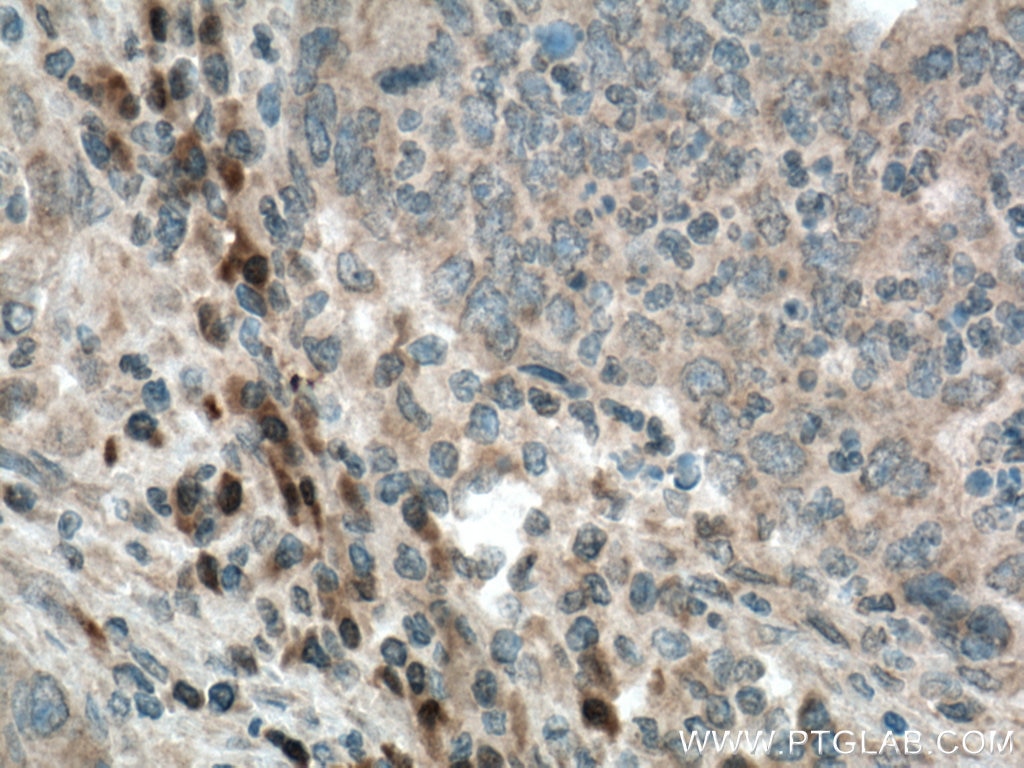- Featured Product
- KD/KO Validated
USP49 Polyklonaler Antikörper
USP49 Polyklonal Antikörper für WB, IHC, ELISA
Wirt / Isotyp
Kaninchen / IgG
Getestete Reaktivität
human, Maus, Ratte
Anwendung
WB, IHC, IP, CoIP, ChIP, ELISA
Konjugation
Unkonjugiert
Kat-Nr. : 18066-1-AP
Synonyme
Geprüfte Anwendungen
| Erfolgreiche Detektion in WB | MCF-7-Zellen |
| Erfolgreiche Detektion in IHC | humanes Kolonkarzinomgewebe, humanes Mammakarzinomgewebe Hinweis: Antigendemaskierung mit TE-Puffer pH 9,0 empfohlen. (*) Wahlweise kann die Antigendemaskierung auch mit Citratpuffer pH 6,0 erfolgen. |
Empfohlene Verdünnung
| Anwendung | Verdünnung |
|---|---|
| Western Blot (WB) | WB : 1:500-1:1000 |
| Immunhistochemie (IHC) | IHC : 1:50-1:500 |
| It is recommended that this reagent should be titrated in each testing system to obtain optimal results. | |
| Sample-dependent, check data in validation data gallery | |
Veröffentlichte Anwendungen
| KD/KO | See 12 publications below |
| WB | See 16 publications below |
| IP | See 1 publications below |
| CoIP | See 2 publications below |
| ChIP | See 1 publications below |
Produktinformation
18066-1-AP bindet in WB, IHC, IP, CoIP, ChIP, ELISA USP49 und zeigt Reaktivität mit human, Maus, Ratten
| Getestete Reaktivität | human, Maus, Ratte |
| In Publikationen genannte Reaktivität | human, Maus, Ratte |
| Wirt / Isotyp | Kaninchen / IgG |
| Klonalität | Polyklonal |
| Typ | Antikörper |
| Immunogen | USP49 fusion protein Ag12697 |
| Vollständiger Name | ubiquitin specific peptidase 49 |
| Berechnetes Molekulargewicht | 73 kDa, 79 kDa |
| Beobachtetes Molekulargewicht | 79-85 kDa |
| GenBank-Zugangsnummer | BC014176 |
| Gene symbol | USP49 |
| Gene ID (NCBI) | 25862 |
| Konjugation | Unkonjugiert |
| Form | Liquid |
| Reinigungsmethode | Antigen-Affinitätsreinigung |
| Lagerungspuffer | PBS with 0.02% sodium azide and 50% glycerol |
| Lagerungsbedingungen | Bei -20°C lagern. Nach dem Versand ein Jahr lang stabil Aliquotieren ist bei -20oC Lagerung nicht notwendig. 20ul Größen enthalten 0,1% BSA. |
Hintergrundinformationen
USPs are cysteine proteases that vary greatly in size and structural complexity. Outside of the core catalytic domain, USPs exhibit N-terminal and C-terminal extensions that have been proposed to play roles in determining cellular localization and substrate specificity of these enzymes(PMID:14715245). USP49(Ubiquitin carboxyl-terminal hydrolase 49) belongs to this family. It has 2 isoforms produced by alternative splicing.
Protokolle
| PRODUKTSPEZIFISCHE PROTOKOLLE | |
|---|---|
| WB protocol for USP49 antibody 18066-1-AP | Protokoll herunterladen |
| IHC protocol for USP49 antibody 18066-1-AP | Protokoll herunterladenl |
| STANDARD-PROTOKOLLE | |
|---|---|
| Klicken Sie hier, um unsere Standardprotokolle anzuzeigen |
Publikationen
| Species | Application | Title |
|---|---|---|
Cell Death Differ Genome-wide screening for deubiquitinase subfamily identifies ubiquitin-specific protease 49 as a novel regulator of odontogenesis.
| ||
EMBO J USP49 negatively regulates tumorigenesis and chemoresistance through FKBP51-AKT signaling.
| ||
Theranostics USP32 confers cancer cell resistance to YM155 via promoting ER-associated degradation of solute carrier protein SLC35F2
| ||
Elife USP49 potently stabilizes APOBEC3G protein by removing ubiquitin and inhibits HIV-1 replication.
| ||
Carcinogenesis USP49 promotes adenocarcinoma of the esophagogastric junction malignant progression via activating SHCBP1-β-catenin-GPX4 axis
| ||
J Cell Mol Med CCAT1/FABP5 promotes tumour progression through mediating fatty acid metabolism and stabilizing PI3K/AKT/mTOR signalling in lung adenocarcinoma. |





